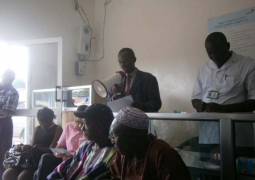A program to promote household and alternative energies in the Sahel, known by its French acronym “PREDAS”, is being implemented by CILSS and its nine member states as a regional program, with support from the European Union and the German Cooperation agency.
The PREDAS program was implemented between 2003 and 2009, and during that period, as part of the activities undertaken, each member country developed its own household energy strategy and action plan.
It was in line with the above that the Ministry of Energy on Thursday held a national sensitisation meeting on the household energy strategy and action plan for the country.
Ada Gaye, permanent secretary at the Ministry of Energy, said the availability of adequate, clean, reliable, efficient and affordable supply of energy, including domestic energy is a complex challenge, cutting across many disciplines such as the environment, forestry, health and household economics. Moreover, it is linked to contextual social and cultural considerations.
He said that despite these factors, there is a growing recognition that access to energy services is important in the achievement of the country’s Programme for Accelerated Growth and Employment (PAGE) and the MDGs.
Domestic energy is a form of energy that is utilized for both cooking and heating, and constitutes more than 80% of the total energy consumption of the Sahelian countries and its main source is biomass resources.
With rapid deforestation and desertification threatening livelihoods in the Sahelian region, the Interstate Committee for the Control of Drought in Sahel (CILSS) with support from European Union and the German Cooperation agency developed a program to promote household and alternative energies in the Sahel.
Speaking at the forum, Asheme Cole, deputy permanent secretary ministry of Agriculture, stated that the objective of PREDAS is to create a conducive framework for an organized and sustainable management of domestic energy resources by ensuring the poorest population of supplies of wood energy at the least cost and in a sustainable manner.
“The action plan is an important document for the management of domestic energy resources in The Gambia,” he said.
Cole commended the commission of Economic and Monetary Union (WAEMU) which provides the funding for the interim phase of the project, of which this is a part.
The forum is the culmination of several years of work in order to have these policy documents in place to guide the management of domestic energy in The Gambia. It is important that the content of these documents be shared, as such was the objective of the gathering, Cole added.
Kemo K. Ceesay, the PREDAS focal point, said the overall objective of PREDAS is to contribute to the research into sustainable management of natural resources and poverty reduction in the Sahel.
Read Other Articles In Article (Archive)




